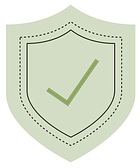Whether for hiking, camping, bushcrafting, hunting, fishing, or just for leisure – the hiking pants are extremely versatile. Their comfortable cut ensures freedom of movement, and the outer pockets (two open front pockets and two closed, side, flat zip pockets) provide space for gear. The ergonomically shaped knee area has a double layer of fabric that protects the pants and knees. The belt loops accommodate belts up to 4 cm wide, such as our leather belt "Unverwüstling". The pants are fastened with a zipper and metal button. The hiking pants are delivered with extra-long legs and can thus be tailored to the perfect individual length for a small fee either by yourself or at any alteration shop. After all, there’s nothing better for hiking than a well-fitting pair of pants!
The optimal fabric for summer outdoor pants
Polycotton combines the advantages of cotton and polyester. The fabric is lightweight and airy, has the pleasant feel of cotton, yet is stable and strong, as one would expect from outdoor clothing. It dries quickly in the air and is resistant to UV radiation.
And in the warm season, this high-quality material combination brings another important advantage: it is breathable and very comfortable to wear in warm temperatures. Additionally, polycotton is easily machine washable up to 40°C.
As with this material, there is a whole range from cheap and less durable junk to long-lasting qualities made from high-quality yarns and a uniform and dense weave. We use selected quality polycotton from European production.
PFC-free water-repellent pre-treated
The fabric is equipped with a PFC-free water-repellent treatment. PFC-free treatments are environmentally friendly because they do not leave non-degradable residues in nature, but they need to be refreshed from time to time. We recommend re-treating with a wax block and heat, for example, with the Dr. Gees impregnation wax we offer. To do this, the wax is simply rubbed onto the fabric like with an eraser and liquefied with an iron at low heat, allowing it to penetrate the fabric. This takes a few minutes and can be repeated as often as desired. Especially before trips, this treatment provides an additional level of moisture protection.
By the way: Every treatment also has an impact on the breathability of a fabric. For example, if I only want to achieve protection against wet meadows in the morning dew, it makes sense to apply the treatment only to the lower leg areas and maintain as much breathability as possible. On longer trekking tours, one would prefer a complete treatment to be maximally protected against rain. But that is exactly the beauty of waxing: you can decide for yourself what makes sense based on the respective conditions.
What to Expect from Waxed Fabrics
There is a lot of half-knowledge and some misunderstandings about waxed fabrics, also known as Waxed Cotton, Waxcotton, or Waxed Polycotton. We explain what the fabrics can do in more detail in our
STEINKAUZ blog.
How to Measure Correctly
Waist MeasurementTake a measuring tape and first measure your waist. Measure at the line where you wear your belt. The measuring tape should lie loosely and without tension, and a shirt can be underneath, as it may later be tucked into the pants. If you don't have a measuring tape handy, a piece of string will also work, which you can mark and then hold against a ruler.
Inseam LengthMeasure from the crotch to the top of your foot, so that the measurement ends about 2-3 cm above the ground.
Size Chart
Size |
EU Size |
US Waist Size |
Waist Width |
S |
48 |
32 |
84-88 cm |
M |
50 |
33 |
89-92 cm |
L |
52 |
34 |
93-96 cm |
XL |
54 |
36 |
97-100 cm |
XXL |
56 |
38 |
101-104 cm |
3XL |
58 |
40 |
105-108 cm |
Do you have any questions?
Feel free to call us at +49 (0)2131-547553 or send an email to
post@steinkauz.com





